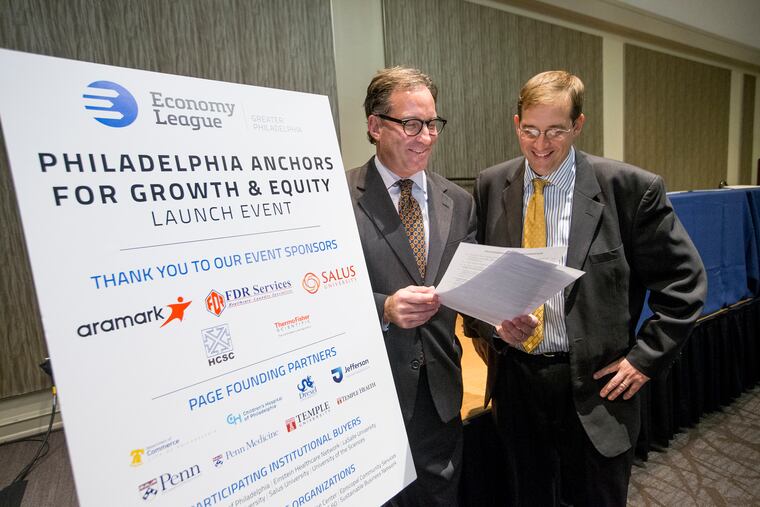Philly’s universities and hospitals should spend more with Black- and brown-owned enterprises, Mayor Kenney says
The Economy League wants to hold accountable the city’s universities, hospitals, and large companies to buy more from local Black and brown-owners and their businesses.

Mayor Jim Kenney and two city councilmembers on Tuesday challenged the city’s “anchor” institutions — influential organizations such as hospitals, universities, or government agencies with roots in Philadelphia — to spend an additional $75 million this year on contracts with local Black and brown businesses.
Kenney gave a pre-recorded keynote address at a virtual summit of large medical and corporate employers and universities, which was hosted by the Economy League of Greater Philadelphia, a think tank based in Center City.
“We’ve bent the poverty curve in the past six years,” Kenney said. “But we have more to do.”
In 2018, Jeff Hornstein, executive director of the Economy League, helped launch Philadelphia Anchors for Growth and Equity (PAGE), a partnership including more than a dozen city institutions that aims to increase local purchasing, making the economy more inclusive, among other aims.
Philadelphia’s “anchor institutions” is a term PAGE uses to describe the city’s universities, hospitals, or large nonprofits that are unlikely to leave the community, such as Children’s Hospital of Philadelphia, Einstein Healthcare Network, and Jefferson Health system. Municipal governments, large corporations, and professional sports teams can also act as anchors and play important roles in local economies through employment, real estate, and purchasing power, the organization says.
Philadelphia’s 34 universities and hospitals alone spend more than $5 billion on goods and services annually, according to the Economy League, with as much as half of that total, by some estimates, spent with firms based outside of the region.
» READ MORE: Philly’s biggest employers spend billions outside the city. Inside a new effort to bring that money home.
“We are challenging our anchors to spend $75 million net new money on contracts with local Black and brown businesses, and we will collect data and track the spending for the next 12 months,” Hornstein said. “There have been pledges over the years, but we still don’t have as many Black millionaires in Philly as we should.”
“We are targeting a few sectors, including construction,” Hornstein said, noting that the city’s anchor institutions spend $300 million just on construction every year.
Other top spending categories include information technology and security contracts. Those three sectors alone total $1 billion out of $2 billion in annual spending, the Economy League estimated in 2019.
City Councilmembers Jamie Gauthier and Mark Squilla echoed the challenge; Squilla also said he would hold Council hearings once a year to track how the supplier diversification process has progressed, in pre-recorded remarks to the virtual gathering.
Recent research from PAGE found that anchors are spending a lot of their money outside the city. Seven of the city’s anchors, including Aramark, Independence Health Group, and Penn Medicine, spent $2 billion in 2019 across 19 categories of goods and services, including construction, security, and IT.
Of that $2 billion, just 22.5% was spent locally and 11.4% on firms owned by underrepresented groups, PAGE found.
“We have to be more intentional in getting opportunities out to the underrepresented communities,” said Clayton Mitchell, senior vice president for real estate and facilities at Jefferson Health, on Tuesday.
Advice for business owners
Panelists on Tuesday’s webinar gave advice to small-business owners of color. About 125 people participated.
“Introduce yourself as the supplier to the decision-maker way ahead of the RFP,” or request for proposal, said Chuck Stefanosky, supplier diversity director at Independence Blue Cross. “Then you’re not just a phone number on a list. Make the personal connections. If you’re [a minority business enterprise] waiting for the RFP, you’re too late.”
He said buy-in from his top leadership “makes it easy to move things forward. We also talk to diverse suppliers at our company, and they frequently recommend someone good. They don’t want to risk their business with a bad recommendation. Then, as they grow, we want them to use our insurance. It’s good business.”
Craig Williams, president and CEO of Pride Enterprises general contractor, said his firm was hired as a construction manager by CHOP, with goals to spend at least 70% with diverse sub-contractors.
But business enterprises with underrepresented owners can face challenges finding insurance and bonding coverage, so CHOP “relaxed the bonding requirements, so we could bring them to the table. If they didn’t do that, the spend would be 35%” diverse sub-contractors, Williams said. Instead, the project is now 90% diverse.
Immediate payment on delivery also helps minority businesses , said J’nelle Lawrence, director of PAGE.
“We hope to encourage our other anchors to move to immediate pay terms in 2022 if they have not done so already,” she said.